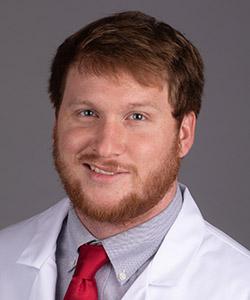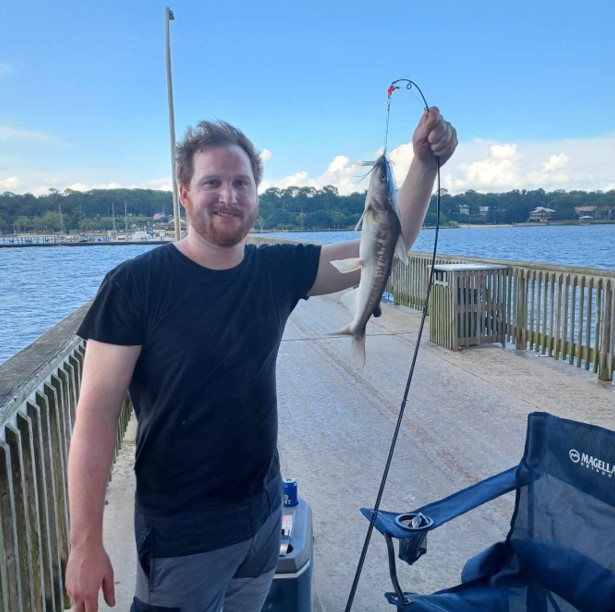
Joel Page, MD, first found himself drawn to neurology by his fascination with human behavior and the origins of consciousness. That passion intensified when, as a medical student, he felt himself driven to help people suffering from neurological conditions. Now, he’s reviewing EEGs, and learning about epilepsy, clinical neurophysiology, and other subjects as one of our newest Clinical Neurophysiology Fellows.
For this week’s Spotlight interview, Page talks to us about his hopes for a future career combining epilepsy and behavioral neurology. He also discusses how his experience as treating a patient dying from pancreatic cancer during his residency year shaped his perspective on medicine and treating patients. Finally, Page shares his loves of birdwatching, hiking, philosophy, and other hobbies when he’s not at Duke.
What are your current responsibilities as a clinical neurophysiology fellow? What does a typical day look like for you?
It depends on the rotation, but generally we start reviewing EEGs in the morning and review with attendings later. We then call teams and let them know relevant findings particularly for ICU patients but also for those on prolonged EEG. We round on patients in the dedicated epilepsy monitoring unit as well.
After rounding, we work to generate reports and review other studies such as scalp EEG, stereo eeg, and evoked potentials. We have rotations in neuro operative monitoring, but I have yet to do that. In addition, academic opportunities abound here. This includes regular didactics in neurophysiology and epilepsy conferences. The epilepsy conferences are very interesting given the complexity of the cases reviewed and the vibrant discussion there.
How and when did you get interested in neurology? How did you decide to pursue a fellowship in clinical neurophysiology?
Even before medical school, I was fascinated by human behavior and its origins; thus, I was naturally drawn to neurology and psychiatry. I found that I felt more driven to help those suffering from neurological disease. I wanted to pursue training in clinical neurophysiology to add a new skill set to my training. Furthermore, I find the cortical localization related to epilepsy to be quite interesting. It’s neat how we can access so much cerebral activity by EEG which cannot be predicted by exam, neuroimaging or even biopsy. Although it is still a crude window into functionality, it provides information about “what’s going on in there” without having to talk to the patient or open the skull up.
What plans do you have for after you complete your fellowship? If you could have any job in the world, what would it be?
For a while, I was really interested in inpatient neurology and epilepsy, but my interest grew to encompass other areas as well. Behavioral/cognitive neurology has also piqued my interest and I will pursue training in that too before going into the “real world.” Hopefully, I can find a way to incorporate the skills I learn here along with subsequent training. In an ideal world, I hope to have exposure to both inpatient neurology/epilepsy along with behavioral neurology which is generally an outpatient subspecialty.
You recently completed your residency at the University of South Alabama. What’s one experience from that time that stands out as particularly useful or memorable?
There were several. However, one that comes to mind not too infrequently comes from my intern year. I was helping to take care of a mother in her 20s quite literally dying of stage IV pancreatic cancer. I remember thinking how cruel and unfair it was, the fear in her eyes, and how utterly hopeless I was at easing her suffering.
I am not sure why she serves as a recurring memory, but I suspect it’s to remind me that we cannot always “heal” or “cure” people. Part of doctoring is guiding people through their suffering. This is particularly so for neurological diseases which are, at this time, often chronic, disabling, and sadly incurable. Although we should never settle for less, we must be ok knowing we cannot always prevail over disease. Unfortunately, it is part and parcel of existence. At the very least, we can strive to better offer comfort and guidance despite how terminal or crippling an illness is.
You can recite Hamlet’s “To Be or Not to Be” soliloquy by memory. When and how did you pick up that skill?
It was a requirement that one of my favorite English teachers in high school thrust upon us. We had to memorize at least one sonnet or soliloquy of Shakespeare. I chose the famed “To be or not to be” soliloquy, probably one of the most iconic contemplations on death. There’s nothing all that exciting about having memorized it other than I have something “interesting” to share. However, it is a beautiful written speech, and it’s crazy and humbling despite advancements in civilization and technology, we are no closer to understanding death than Shakespeare was. I guess you could say he at least expressed our collective ignorance on this issue eloquently.
What other passions or hobbies do you have outside of the Department?
I enjoy reading and am part of a book club with a couple of my close friends. Hiking, fishing and birdwatching are also great. Tennis, chess, philosophy, traveling, and coffee aren’t bad either.
